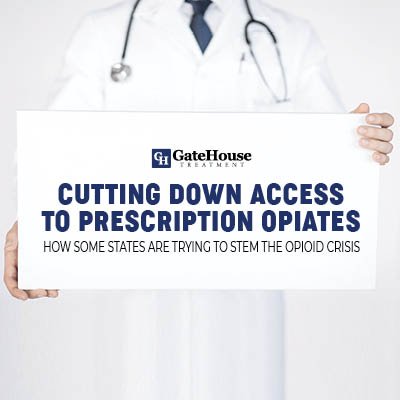
With the opioid crisis living in our homes, our schools, and workplaces, it’s not something that can be ignored. The government is beginning to take more steps to stop addiction before it has a chance to start. Many of our loved ones, neighbors, and friends have become addicted to prescription painkillers from an injury or a minor surgery. The government is stepping in to help stop the flow of unneeded opioids in homes and on the street.
State laws in Michigan, Florida, and Tennessee were recently passed that greatly limit the number of opioid medications doctors can prescribe to patients. In 2014, nearly 2 million people either abused or were dependent on prescription opioid pain relievers; it has only grown since then. Although it’s only been passed in 3 states, it’s a start. In Michigan, doctors can only prescribe a 7-day supply of opioid medication to patients suffering from acute pain. Doctors won’t be allowed to write a refill for the prescription until the seven-day period is over.
The Difference in the States
The point of these laws is to make prescription opioid medications less accessible, Tennessee is also making strides with their new law. Pharmacists can only partially refill a prescription for no more than half the number of days it was written for. For example, if someone has a prescription for opioids due to a sprained ankle for 10 days, the most they can get prescribed is another 5 days. The law requires doctors to document the specific reason a patient is receiving the medication and that they’re getting it with informed consent. The prescriber must tell you that it can be addictive. Even taken as prescribed, these medications can cause dependency.
Florida is taking things to another level with the restrictions they’re placing on prescription opioids. Doctors are now limited to prescribing a 3-day supply for instances of acute pain unless criteria are met for a 7-day supply. Patients will also be looked up in the state database to have their history reviewed. If they have repeated medication seeking behaviors they can get denied.
They’re Still Prescribing Opioids, how can This Help?
Opioid medications will always be on the market; they are effective medications. It has spurred an epidemic of abuse and misuse, unfortunately. The aim is to make prescription opioids less available. With fewer pills being prescribed, the less likely they are to be abused. According to the Prescription Opioids and Heroin Research Report, nearly 80% of heroin users reported using prescription opioids before using heroin. The hope is that by bypassing these laws; we can stop the progression that so many have spiraled into. From prescription drug use (prescribed or not) to heroin use.
People are still becoming addicted every day from construction workers to nurses, teachers, and high school athletes. Addiction doesn’t discriminate. Most people don’t realize that they are addicted to prescription painkillers until it is too late. Overdoses from opioids are killing around 115 Americans a day, opiates now kill more people than breast cancer and even car accidents. The opioid epidemic didn’t happen overnight. It’s not going to go away anytime soon unless something is done about it. The steps that states are taking in the beginning.
Access to treatment and a decrease in the number of prescription opioids in circulation are two of the components to the equation. If more legislation like this is passed, it could benefit many people. This is just another step in the right direction. No one thinks they or a family member could become addicted, yet it happens every day. Being unaware of the true danger of prescription opiates is setting people up for addiction. Educate yourself and your family about the dangers of opioid addiction.
If you or a loved one are struggling with opioids, reach out to us here at GateHouse Treatment and we can help. Call us at (855) 448-3588. You can heal, we can help.
- Cymbalta Withdrawal: Causes, Symptoms, And Management - October 12, 2023
- Boredom in Recovery: 5 Tips to Avoid Relapse - October 6, 2023
- Overconfidence and Rehab: Avoiding Relapse - October 4, 2023




